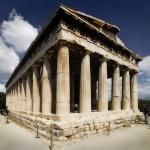|
This section contains 1,063 words (approx. 4 pages at 300 words per page) |

|
Methods of Training.
Formal music education is known in Athens from the beginning of the fifth century B.C.E. Before this, people interested in learning to sing or play an instrument could study informally under someone else, or even teach themselves. A professional bard would train a talented pupil in return for lodging, food, and clothes. Repertoire and technique were passed down orally and by rote; it is unlikely that there was any tradition of teaching pupils how to read music. The large choral groups, which performed at public festivals, did require organized training by a chorus-leader (khoregos), who may also have taught participants to read the poetry. From the seventh to sixth centuries B.C.E., there were active music centers at Sparta, where Alcman composed his partheneia (girls' choral dances), and on the island of Lesbos, where Sappho set up choruses for girls...
|
This section contains 1,063 words (approx. 4 pages at 300 words per page) |

|




